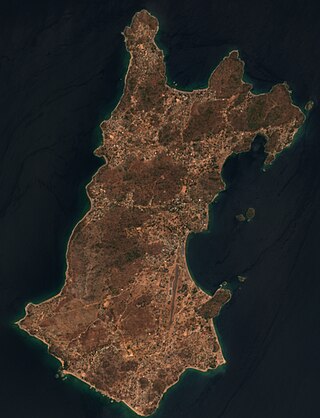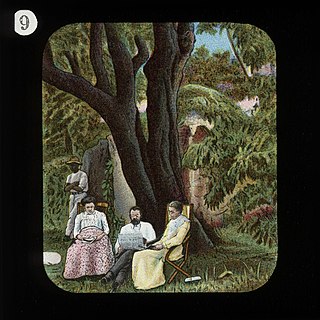
Sir Henry Morton Stanley was a Welsh-American explorer, journalist, soldier, colonial administrator, author and politician who was famous for his exploration of Central Africa and his search for missionary and explorer David Livingstone. Besides his discovery of Livingstone, he is mainly known for his search for the sources of the Nile and Congo rivers, the work he undertook as an agent of King Leopold II of the Belgians which enabled the occupation of the Congo Basin region, and his command of the Emin Pasha Relief Expedition. He was knighted in 1897, and served in Parliament as a Liberal Unionist member for Lambeth North from 1895 to 1900.

David Livingstone was a Scottish physician, Congregationalist, pioneer Christian missionary with the London Missionary Society, and an explorer in Africa. Livingstone was married to Mary Moffat Livingstone, from the prominent 18th-century Moffat missionary family. Livingstone came to have a mythic status that operated on a number of interconnected levels: Protestant missionary martyr, working-class "rags-to-riches" inspirational story, scientific investigator and explorer, imperial reformer, anti-slavery crusader, and advocate of British commercial and colonial expansion. As a result, Livingstone became one of the most popular British heroes of the late 19th-century Victorian era.

Geographical exploration, sometimes considered the default meaning for the more general term exploration, refers to the practice of discovering remote lands and regions of the planet Earth. It is studied by geographers and historians.

The Luapula River is a north-flowing river of central Africa, within the Congo River watershed. It rises in the wetlands of Lake Bangweulu (Zambia), which are fed by the Chambeshi River. The Luapula flows west then north, marking the border between Zambia and the Democratic Republic of the Congo before emptying into Lake Mweru. The river gives its name to Zambia's Luapula Province.

Likoma Island is the larger of two islands in Lake Malawi, in East Africa, the smaller being the nearby Chizumulu. Likoma and Chizumulu both belong to Malawi, and together they make up the Likoma District. Although both islands lie just a few kilometres from Mozambique, and are entirely surrounded by Mozambican territorial waters, they are both exclaves of Malawi.

Joseph Thomson was a British geologist and explorer who played an important part in the Scramble for Africa. Thomson's gazelle and Thomson's Falls, Nyahururu, are named after him. Excelling as an explorer rather than an exact scientist, he avoided confrontations among his porters or with indigenous peoples, neither killing any native nor losing any of his men to violence. His motto is often quoted to be "He who goes gently, goes safely; he who goes safely, goes far."

The geography of North Africa has been reasonably well known among Europeans since classical antiquity in Greco-Roman geography. Northwest Africa was known as either Libya or Africa, while Egypt was considered part of Asia.

A mosquito net is a type of meshed curtain that is circumferentially draped over a bed or a sleeping area to offer the sleeper barrier protection against bites and stings from mosquitos, flies, and other pest insects, and thus against the diseases they may carry. Examples of such preventable insect-borne diseases include malaria, dengue fever, yellow fever, zika virus, Chagas disease, and various forms of encephalitis, including the West Nile virus.

The Selous Game Reserve, now renamed as Nyerere National Park (in-part), is a protected nature reserve and wilderness area in southern Tanzania, East Africa. It covers a total area of 50,000 km2 (19,000 sq mi), with additional buffer zones, as well. It was designated a UNESCO World Heritage Site in 1982, owing to its high levels of biodiversity and vast, undisturbed natural landscapes, such as the grasslands and the miombo woodlands habitat. Among the numerous species within the park are some of the continent's largest and most iconic, such as the bush elephant, black rhinoceros, hippopotamus, lion, leopard, spotted hyena, painted dog, Cape buffalo, Masai giraffe, plains zebra, white-bearded gnu and the giant Nile crocodile. Due to the fragility and sensitivity of the many species and ecosystems within the park, human habitation is not permitted within its bounds, and all persons entering and exiting are tallied and tracked by the Wildlife Division of the Tanzanian Ministry of Natural Resources and Tourism.
Expedition 360 is the name of a successful attempt by Briton Jason Lewis to be the first person to circumnavigate the globe using only human power – no motors or sails. It was begun by Lewis and Stevie Smith in 1994 and ended at 12:24 pm on 6 October 2007, when Lewis re-crossed the prime meridian at Greenwich, London, having travelled 74,842 km (46,505 mi).

Baron Karl Klausvon der Decken was a German explorer of eastern Africa and the first European to attempt to climb Mount Kilimanjaro.

Stanley and Livingstone is a 1939 American adventure film directed by Henry King and Otto Brower. It is loosely based on the true story of Welsh reporter Sir Henry M. Stanley's quest to find Dr. David Livingstone, a Scottish missionary presumed lost in Africa, who he finally met on November 10, 1871. Spencer Tracy plays Stanley, while Cedric Hardwicke portrays Livingstone. Other cast members include Nancy Kelly, Richard Greene, Walter Brennan, Charles Coburn and Henry Hull.

Johannes Rebmann, also sometimes anglicised as John Rebman, was a German missionary, linguist, and explorer credited with feats including being the first European, along with his colleague Johann Ludwig Krapf, to enter Africa from the Indian Ocean coast. In addition, he was the first European to find Kilimanjaro. News of Rebmann's discovery was published in the Church Missionary Intelligencer in May 1849, but disregarded as mere fantasy for the next twelve years. The Geographical Society of London held that snow could not possibly occur let alone persist in such latitudes and considered the report to be the hallucination of a malaria-stricken missionary. It was only in 1861 that researchers began their efforts to measure Kilimanjaro. Expeditions to Tanganyika between 1861 and 1865, led by the German Baron Karl Klaus von der Decken, confirmed Rebmann's report. Together with his colleague Johann Ludwig Krapf they were also the first Europeans to visit and report Mount Kenya. Their work there is also thought to have had effects on future African expeditions by Europeans, including the exploits of Sir Richard Burton, John Hanning Speke, and David Livingstone.
The Transglobe Expedition (1979–1982) was the first expedition to make a longitudinal (north–south) circumnavigation of the Earth using only surface transport. British adventurer Sir Ranulph Fiennes led a team, including Oliver Shepard and Charles R. Burton, that attempted to follow the Greenwich meridian over both land and water. They began in Greenwich in the United Kingdom in September 1979 and travelled south, arriving at the South Pole on 15 December 1980. Over the next 14 months, they travelled north, reaching the North Pole on 11 April 1982. Travelling south once more, they arrived again in Greenwich on 29 August 1982. It required traversing both of the poles and the use of boats in some places. Oliver Shepard took part in the Antarctic leg of the expedition. Ginny Fiennes handled all communications between the land team and their support, and ran the polar bases.

Between 1874 and 1877 Henry Morton Stanley traveled Central Africa east to west, exploring Lake Victoria, Lake Tanganyika and the Lualaba and Congo rivers. He covered 7,000 miles (11,000 km) from Zanzibar in the east to Boma at the mouth of the Congo in the west. The expedition resolved several open questions concerning the geography of Central Africa, including identifying the source of the Nile, which he proved was not the Lualaba and is in fact the source of the Congo River.
Expedition Africa is an eight-part reality television miniseries that originally aired from May 31, 2009 to July 12, 2009 on History. Produced by Mark Burnett, the program follows four modern day explorers—a navigator, a wildlife expert, a survivalist, and a journalist—as they substantially retrace H.M. Stanley's famed expedition to find Dr. David Livingstone. Their route deviates somewhat from Stanley's in that it includes a treacherous crossing of the Uluguru Mountains, which Stanley circumvented. Additionally, whereas Stanley took roughly 8 months to find Livingstone, the explorers on the show have 30 days to complete the 970-mile journey deep into the interior of Tanzania.
Major explorations of Earth continued after the Age of Discovery. By the early seventeenth century, vessels were sufficiently well built and their navigators competent enough to travel to virtually anywhere on the planet by sea. In the 17th century, Dutch explorers such as Willem Jansz and Abel Tasman explored the coasts of Australia. Spanish expeditions from Peru explored the South Pacific and discovered archipelagos such as Vanuatu and the Pitcairn Islands. Luis Vaez de Torres chartered the coasts of New Guinea and the Solomon Islands, and discovered the strait that bears his name. European naval exploration mapped the western and northern coasts of Australia, but the east coast had to wait for over a century. Eighteenth-century British explorer James Cook mapped much of Polynesia and traveled as far north as Alaska and as far south as the Antarctic Circle. In the later 18th century, the Pacific became a focus of renewed interest, with Spanish expeditions, followed by Northern European ones, reaching the coasts of northern British Columbia and Alaska.

This timeline of European exploration lists major geographic discoveries and other firsts credited to or involving Europeans during the Age of Discovery and the following centuries, between the years AD 1418 and 1957.

Mary Livingstone was the wife of the Scottish Congregationalist missionary David Livingstone. She was a linguist, an experienced traveller, and managed the household affairs including missionary stations and infant school.

Albrecht Roscher was a German explorer of Africa. He was murdered near Lake Malawi in 1860.
















